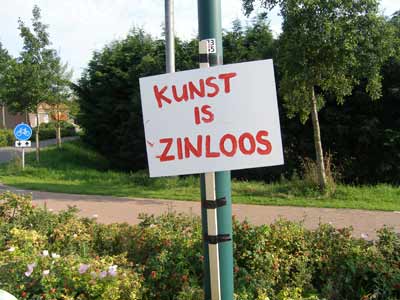
image: staged protest outside Het Reservaat, Leidsche Rijn, Holland (Sophie
Hope). Translation: Art is useless. (See case studies for more info)
What is my research about?
What is the relationship between cultural democracy and commissioning
art to effect social change?
Over the past ten years, New Labour cultural policy and corporate social
responsibility agendas have been financially supporting art that is socially
engaged as this holds currency for a State that needs to be seen to be effecting
change through the active participation of its citizens. I propose that
cultural democracy as a way of practicing critical knowledge and political
agency has been negated through this increasing dependency on a culture
of commissioning art to effect social change.
In this context my doctoral study addresses the beneficiaries of the contracts
between art, government, business and communities in order to evaluate what
constitutes a critical art practice that is employed to have a positive
effect on society. To what extent are notions of criticality shared, embraced,
ignored or discarded by those involved in the commissioning process?
The tensions between cultural democracy and the development of a commissioning
culture for art in the UK are explored through policy, theory and practice.
The roots of cultural democracy and the funding of community art practices
are traced from 1960 to 2007 through the development of cultural policy
in relation to political and social art practices. The theoretical foundations
of these tensions are also addressed through the writings of Freire (1972),
Illich (1973), Ranciere (2004 and 2007), Rowbotham (1979) and Trinh T. Minh-ha
(1991, 1992 and 1999). A series of performative interviews with artists
and funders about the commissioning experience and critical friends, a group
of ‘participants’ of art commissions are practical exercises that together
with the theory and policy sections aim to further a critique of cultural
democracy in the 21st Century.
This is not an argument against funding for art in the nostalgic pursuit
of lost artistic autonomy, rather it is an attempt to develop a critical
language and practice that negotiates the dilemma of practicing cultural
democracy through the professional artists’ brief. I am interrogating the
contradictory desire to disrupt expectations of the function of art whilst
fighting for the right to be paid to do that dismantling. Is the art commission
a valid or redundant site for practicing cultural democracy?
Why am I doing a PhD?
I wanted to continue practicing but also rigorously question my motivations,
tactics and mode of operation. Am I really being critical through my work?
What does it mean to be political in the current economic climate when socially
engaged art is all the fashion? I want to take stock and delve deep into
the histories and theories of this practice so I can locate my own practice
more intelligently and sensitively within this wider trajectory.
Why is it a practice based PhD?
I am doing a practice -based PhD which means that by 2010 I need to have
written 50,000 words and have evidence of a body of work. This will include
past work and new work and the analysis of these projects.
